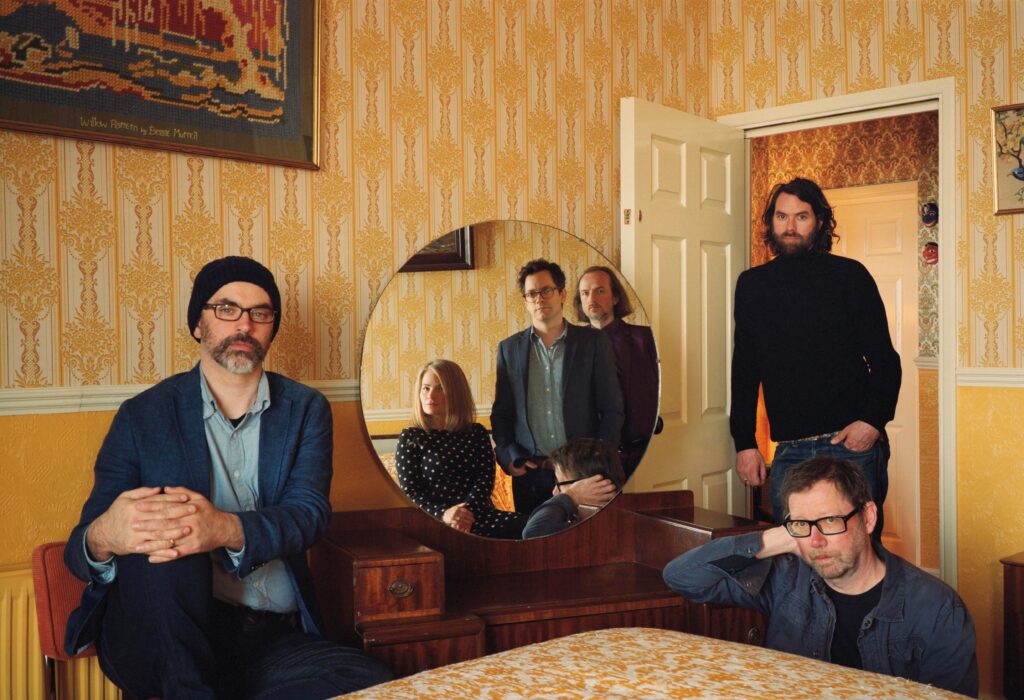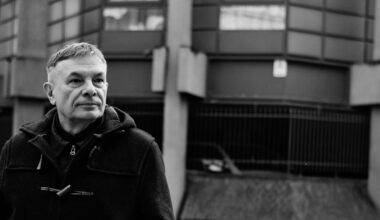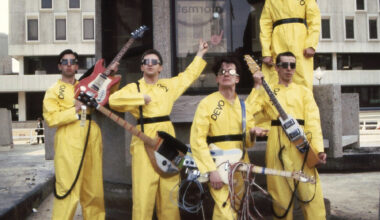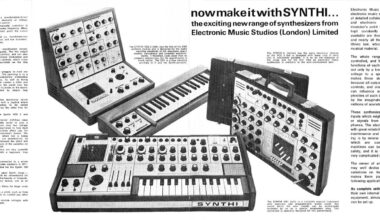Tunng are a band full of strange misfits. which is a good thing. It’s why the twinkling lights and long shadows of their new album, ‘songs you make at night’, sets it up as a proper contender for one of our records of the year
There’s a track called ‘Evaporate’ on Tunng’s new album which tells of someone taking on the soul of a bird, then rising from the soil to split into multiple pieces. First into two, then into four, then into eight. It’s horrific and strange, couched in pastoral guitars and layered vocals, until the whole song breaks down into distortion. Despite its mix of folk and electronica, it’s far from the sweetness of either.
“That image of splitting into pieces is scary, but it’s also magical,” says Sam Genders, the writer of ‘Evaporate’ and a man who knows a thing or two about separation. “It occurred to me recently that my wife was pregnant at the time I wrote that song. That light and dark thing is very much my experience of life – things can be challenging but also quite wonderful. I’ve got a real bit of both.”
It’s a cliché to refer to a band as a “best-kept secret”, but this applies to Tunng more than most. Their new album, ‘Songs You Make At Night’, is their sixth long-player but their first release since 2013, and behind its creation is a journey that has seen them avoid the bestseller lists and instead chart out something rather unique.
Tunng started as a duo consisting of vocalist Sam Genders and guitarist Mike Lindsay. They caught the delicate wave of “folktronica”, a buzzword described by one journalist as “laptops replacing lutes”. Their 2005 debut album, ‘Mother’s Daughter And Other Songs’, was full of digital flourishes and prompted a particularly hand-wringing Pitchfork review about whether to call it folktronica at all.
Sam and Mike responded by beefing up the band to a six-piece and chucking in more electronics. They toured with whimsical rockers Doves and covered tracks by Bloc Party and Tim Buckley, the latter getting a play on the glossy US TV teen romp ‘The OC’. Every mid-2000s musical trope ticked.
Tunng’s third album, ‘Good Arrows’, made a stir in 2007, not least for the quirky clockwork rhythms of the earwormy ‘Bullets’, a folk song that has had getting on for a million views on YouTube. But delve into ‘Bullets’ and you’ll find a clue to what lay in store for the band. The lines “So sweet to lose a friend / You leave the church and taste the air in your lungs” came true. Once their gig commitments had been fulfilled, Sam stepped away from Tunng in 2009 – and it was a bit of a wrench.
“There was some ego and wanting recognition as a songwriter,” says Sam of his departure. “But also I struggled a lot with life. I needed to do things for myself, to find some space and make some mistakes. I felt horrible and upset and angry, but it was never an acrimonious break-up.”
Mike also wonders what could have been, but it’s not a thought that dims his love and respect for his Tunng co-founder.
“We were upset about it,” he admits. “We were probably at the peak of our career, which we never really got back. But we all adore Sam and you have to respect his reasons. It’s a band full of strange misfits and everyone’s got to take their time out.”
Sam became a teaching assistant in a hard-as-nails school and his withdrawal from Tunng would last nearly a decade. But all was not lost. The band turned out two very decent albums without him, earning them comparisons to Broadcast and Animal Collective. There was also an interesting distraction for Tunng’s resident electronic twiddler Phil Winter, who formed Wrangler with Stephen Mallinder (Cabaret Voltaire) and Benge (John Foxx And The Maths), while Mike Lindsay recently teamed up with Brit Award-winning vocalist Laura Marling in an outfit they’ve called LUMP.
“Laura can listen to a texture and then, with a notepad and pen, scrawl down poetic beauty,” says Mike. “Within half an hour, she’s on the mic singing melodies. The only person I know who is as quick as her is Sam.”
Sam Genders was no stranger during this time, even making the occasional guest appearance at Tunng gigs, but it wasn’t until Sam and Mike worked on a new project together that his divorce from his old band came into sharp relief. It was a couple of years ago that Sam came knocking on Mike’s door to record an album as a two-piece under the name of Throws. You may have come across the melancholic surf funk of their 2016 single, ‘The Harbour’, in which they declare, “We are human / And we hurt each other / And we hurt ourselves”.
Mike was living in Reykjavík at the time. And with guest slots from Múm vocalist Sigurlaug Gísladóttir and Sigur Rós’ neo-classical collective amiina, Throws’ eponymous debut album was a very lively and very Icelandic affair.
“It was so liberating,” says Mike. “It was the first time since ‘Mother’s Daughter’ that Sam and I didn’t have any sort of label to worry about. There were no rules. We had that energy back. We were dancing around the studio.”

Fast forward a little further and the latest chapter in the story began when the pair started to write a follow-up to ‘Throws’. They sketched out a couple of songs, but just three days into the studio session they realised what they were doing was too electronic for a Throws record.
“Both of us thought this was sounding like a Tunng record,” Mike remembers. “We missed Sam singing in the style of old Tunng, so we phoned up everybody else in the band and said, ‘Let’s get back together’.”
Together but separate, that is. There have been a lot of changes in the Tunng camp just lately, with several members becoming parents, so crafting ‘Songs You Make At Night’ was something of a jigsaw operation – where the pieces weren’t always in the same room at the same time. At no point did the entire line-up meet. Instead, the process largely revolved around Mike’s recording space. Most of the tracks started with a basic musical idea from Mike, with Sam humming melodies until something started to form.
“It was often a question of working out how to bring out the bed of atmos wonk, to create how it should sound in the Tunng world,” explains Mike. “I wanted to stick to just a few instruments, so I had this Moog Mother-32 modular for all the basslines. I also used an Elektron Machinedrum and a Nord Drum pad, plus this Roland U-220, a 90s sound module that has awesome drum ‘n’ bass swell stuff. So that was the starting point. Once we’d established that as a sort of palate, we got everybody else involved one by one.”
“Ashley [Bates] did these beautiful, fluttery, nylon string guitar parts,” says Sam. “Martin [Smith], who’s a multi-instrumentalist, did the twinkly, crunchy percussion that’s in our early records. Becky [Jacobs] added a female voice and Phil [Winter] came with his samples and the higher-end stuff – the hi-hat parts, the little glitches, the little fiddly bits.”
And just like the old days, Sam saw his lyrical creations rise up and divide into all sorts of flavours. Tunng really were back on.
As if to prove the point, Sam turned his attention to ‘Jenny Again’, a song he had written for the band’s 2006 album, ‘Comments Of The Inner Chorus’. It tells of a woman caught in a loveless relationship who ends up bumping off her bloke and shacking up with his brother. In the video for the track, the red-headed Jenny is seen considering a field of violets as she escapes with her new lover, the murder victim lying stricken in the grass. On ‘Songs You Make At Night’, we enter Jenny’s psyche after things didn’t work out with the brother and she’s living on her own in a seaside town.
“I started wondering how it would be if Jenny was now living alone by the sea and was haunted by this terrible thing she’d done,” says Sam. “From there, I had this idea that all the songs we were writing were sort of night terrors in the mind of this one character. Then I used that idea to help me write more songs.”
Mike moved to Margate during the making of the new album, which cemented the seaside plot. He found a flat and began converting it into something he calls a “beach house studio vibe”. He painted his front room blue and installed a mustard yellow sofa. Sam’s concept of the album being a sleep cycle of the girl from ‘Jenny Again’ was still incredibly fresh in Mike’s mind when he discovered something rather coincidental. Rather magical, in fact.
“My new flat was previously owned by a woman called Amber,” he explains. “It turned out that she was the actress who had played Jenny in the ‘Jenny Again’ video. So suddenly, there I was living in Jenny’s house and all the premonitions that Sam and I had had two weeks beforehand became real. It was pretty mind-blowing!”
Speaking of spooky things, ‘Songs You Make At Night’ continues Tunng’s love for the darker side of English folk music. Or, as Phil Winter puts it, “the unknown and what goes on in the countryside”. There’s a real feel for the uncanny – images of people with “faces made of plasticine living life inside machines” on the irrepressibly catchy ‘Flatland’, for example – and much of this stuff was inspired by Sam’s bookshelves.
One of the first tracks to drop from the new album was ‘Crow’, which includes the line, “We bide our time and we crawl through mud”. This was prompted by ‘Grief Is The Thing With Feathers’, Max Porter’s acclaimed novel in which a crow visits a pair of motherless children. Sam also cites ‘Crow’ by Ted Hughes and ‘A Year Of Marvellous Ways’ by Sarah Winman, about a pensioner who sits by a remote creek looking through a telescope. But while many of the tracks reach some very strange places, there are still oodles of melodic hooks.
“The thing about Tunng is, it wouldn’t be a surprise if there was a dodgy Balearic house track on one side of the album and a Balkan-sounding track on the other side,” says Mike. “That’s what’s so good about working with Sam. On our third record, he came up with ‘Bullets’, and that was the scariest ‘Oh, I’m not sure we can go there’ moment. But we did go there and it became a big tune. Ever since then, we’ve been excited by these types of ideas.”
The next challenge for the group is to take ‘Songs You Make At Night’ out on tour, which isn’t an easy call when you have so much “atmos wonk” in post-production. It means a fatter sound, with more sub-basses, and shuffling a few performing roles around. It also means a rider suitable for a reunited band that is longer in the tooth than it used to be.
“The vocals are supposed to be quite calm and otherworldly but it, er, got to the stage where perhaps they weren’t,” laughs Mike. “We’d had to pare down our rider and strike out the gin and the bourbon. But I think we can put those drinks back on the rider again because we’re much wiser now. Probably.”
The net effect of Tunng’s magical realism, in terms of both lyrics and tones, together with the notion that everything takes place inside an imaginary person’s mind, gives ‘Songs You Make At Night’ a dream-like quality. Someone taking on the soul of a bird, then rising from the soil and splitting, seems quite normal here.
Sleep is a theme that runs throughout the album, which is bookended by songs called ‘Dream In’ and ‘Dream Out’. Despite this, the band seem to have a rather troubled relationship with sleep.
“After a Tunng show in Istanbul, I woke up in Phil’s bed, cuddling him,” says Mike. “Then I woke up again back in my own bed and all I could hear was Ashley screaming that someone had pissed in his shoes.”
And as a child, Sam once awoke to find his pyjama bottoms were in a bucket in the bathroom.
“I can’t remember why there was a bucket in the bathroom,” he says. “I don’t know. It’s a mystery.”
Sharing stories like these, it seems that the renewed partnership of Sam Genders and Mike Lindsay promises much for the reunited and revived Tunng. Despite Sam’s hiatus years, maybe they were never so separate after all.
‘Songs You Make At Night’ is out on Full Time Hobby






